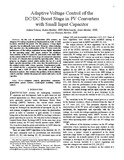Adaptive voltage control of the DC/DC boost stage in PV converters with small input capacitor
Fecha
2013Versión
Acceso abierto / Sarbide irekia
Tipo
Artículo / Artikulua
Versión
Versión aceptada / Onetsi den bertsioa
Impacto
|
|
10.1109/TPEL.2013.2240702
Resumen
In the case of photovoltaic (PV) systems, an adequate PV voltage regulation is fundamental in order to both maximize and limit the power. For this purpose, a large input capacitor has traditionally been used. However, when reducing that capacitor size, the nonlinearities of the PV array make the performance of the voltage regulation become highly dependent on the operating point. This paper analy ...
[++]
In the case of photovoltaic (PV) systems, an adequate PV voltage regulation is fundamental in order to both maximize and limit the power. For this purpose, a large input capacitor has traditionally been used. However, when reducing that capacitor size, the nonlinearities of the PV array make the performance of the voltage regulation become highly dependent on the operating point. This paper analyzes the nonlinear characteristics of the PV generator and clearly states their effect on the control of the DC/DC boost stage of commercial converters by means of a linearization around the operating point. Then, it proposes an adaptive control, which enables the use of a small input capacitor preserving at the same time the performance of the original system with a large capacitor. Experimental results are carried out for a commercial converter with a 40 μF input capacitor, and a 4 kW PV array. The results corroborate the theoretical analysis; they evidence the problems of the traditional control, and they validate the proposed control with such a small capacitor. [--]
Materias
Adaptive control,
Photovoltaic converters,
Photovoltaic power systems,
Small-signal modeling,
Voltage control
Editor
IEEE
Publicado en
IEEE Transactions on Power Electronics, vol. 28, no. 11, pp. 5038-5048
Departamento
Universidad Pública de Navarra. Departamento de Ingeniería Eléctrica y Electrónica /
Nafarroako Unibertsitate Publikoa. Ingeniaritza Elektrikoa eta Elektronikoa Saila
Versión del editor
Entidades Financiadoras
This work was supported in part by the Spanish Ministry of Economy and Competitiveness under Grants DPI2009-14713-C03-01 and DPI2010-21671-C02-01 and by the Public University of Navarra.





